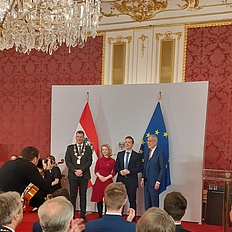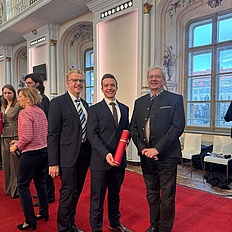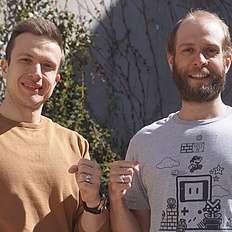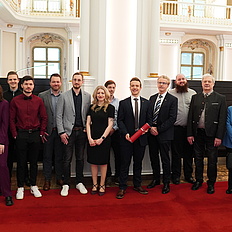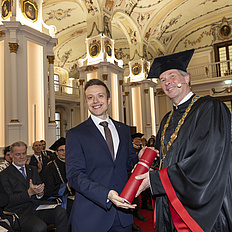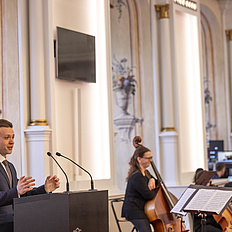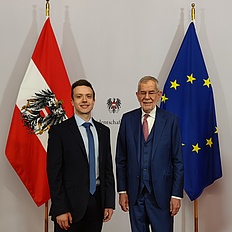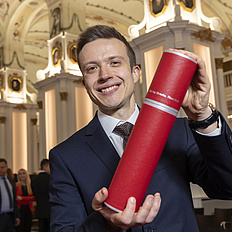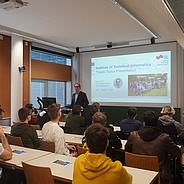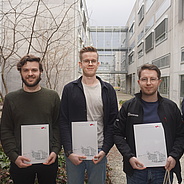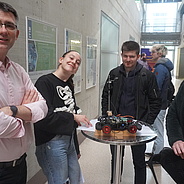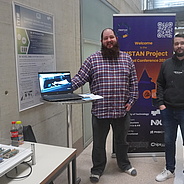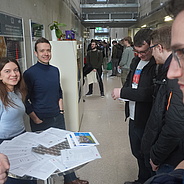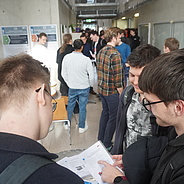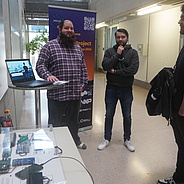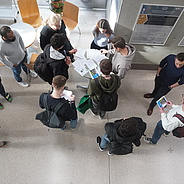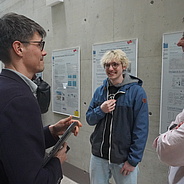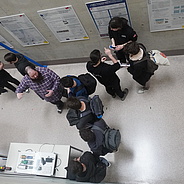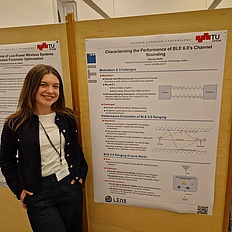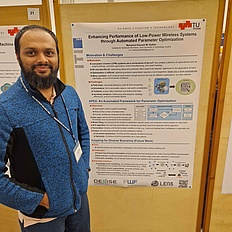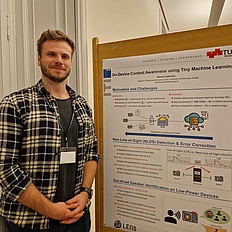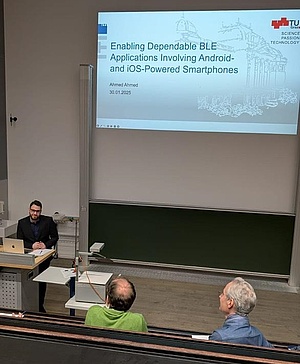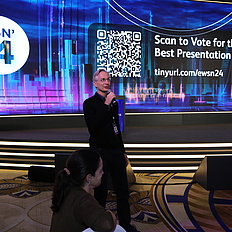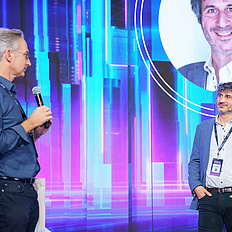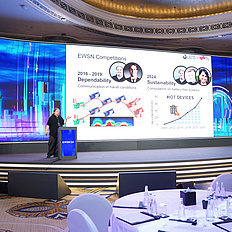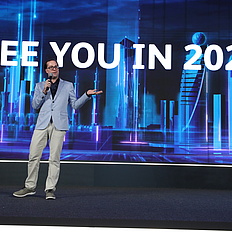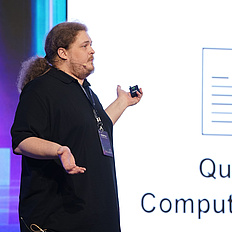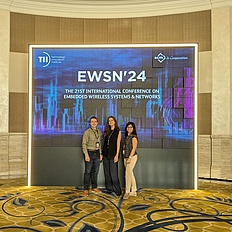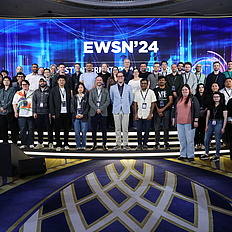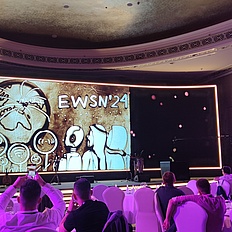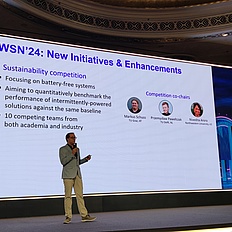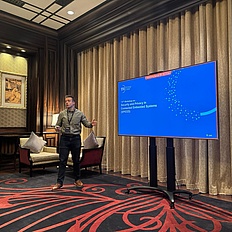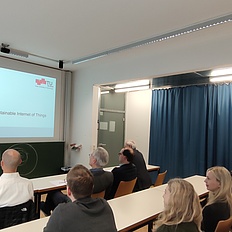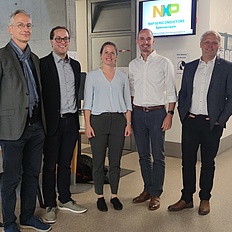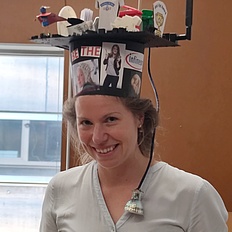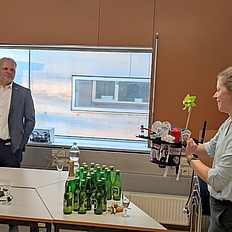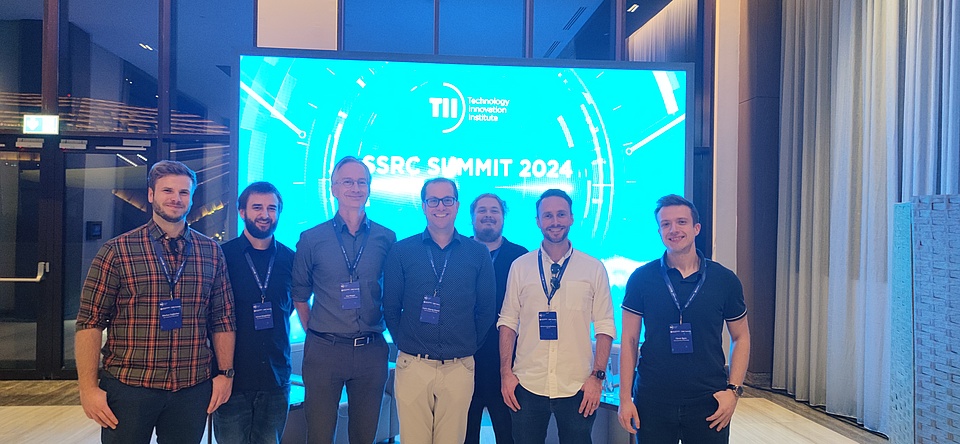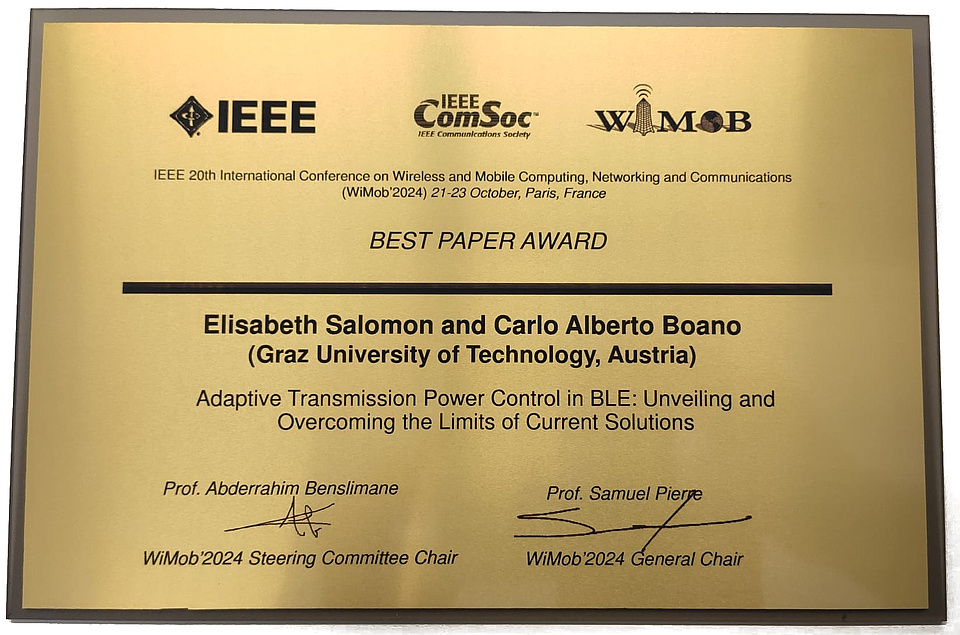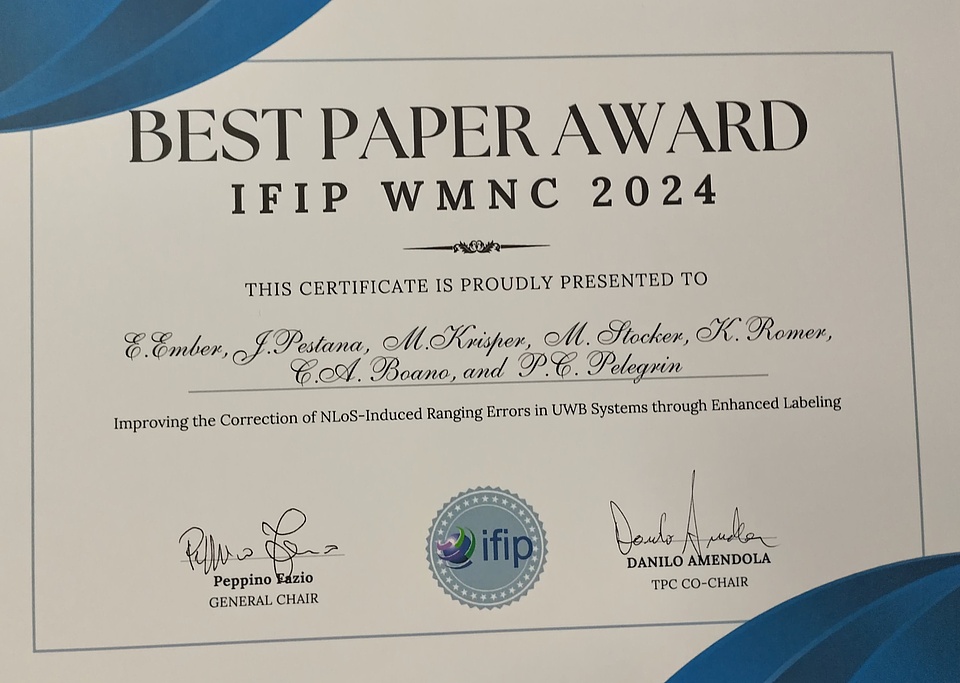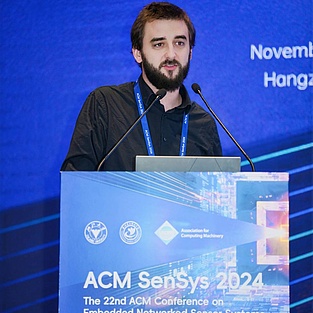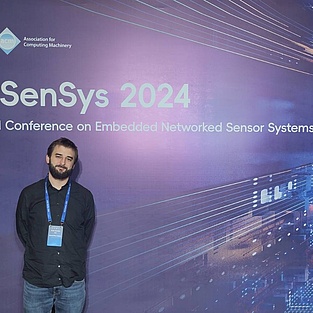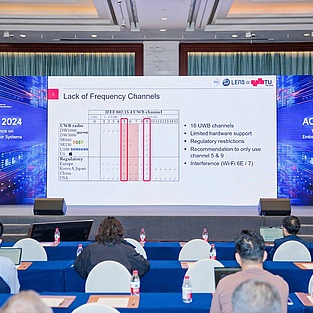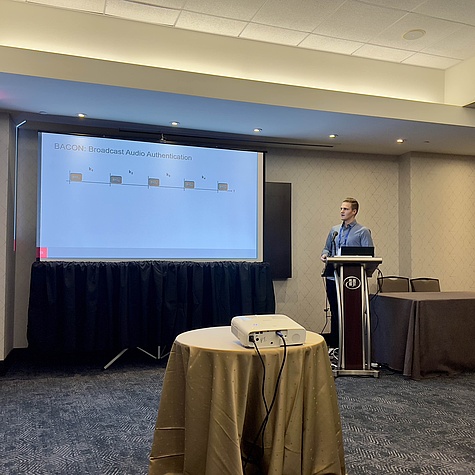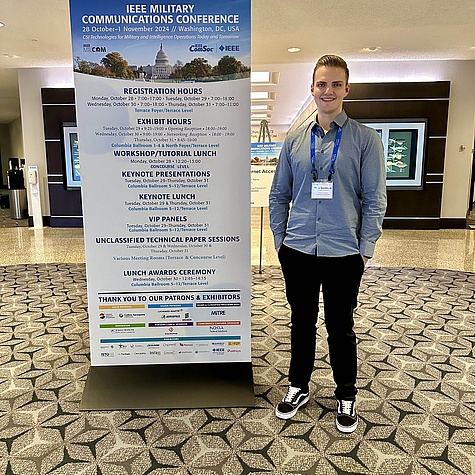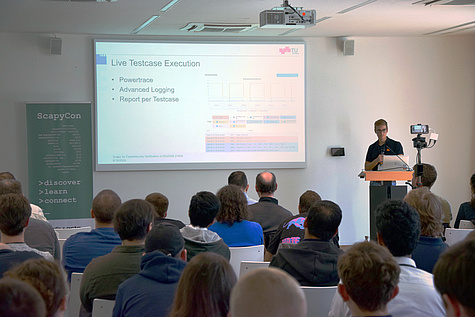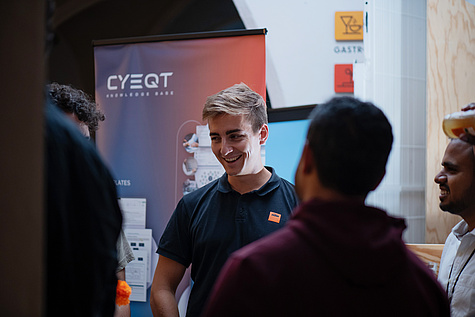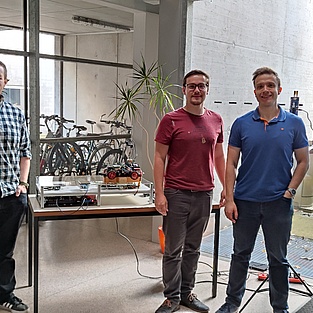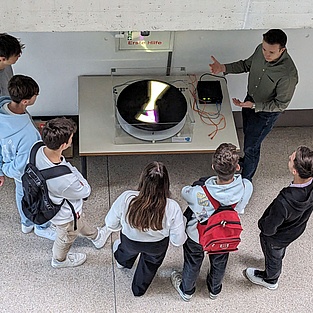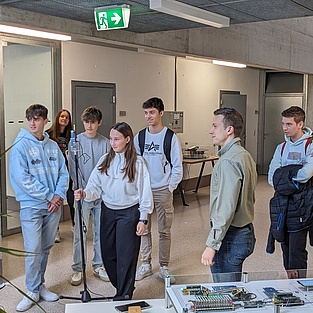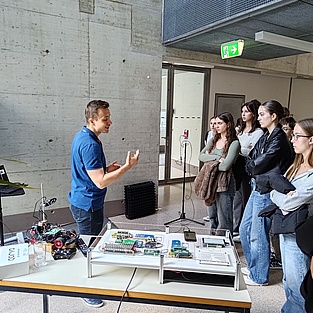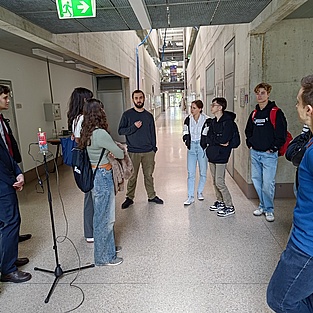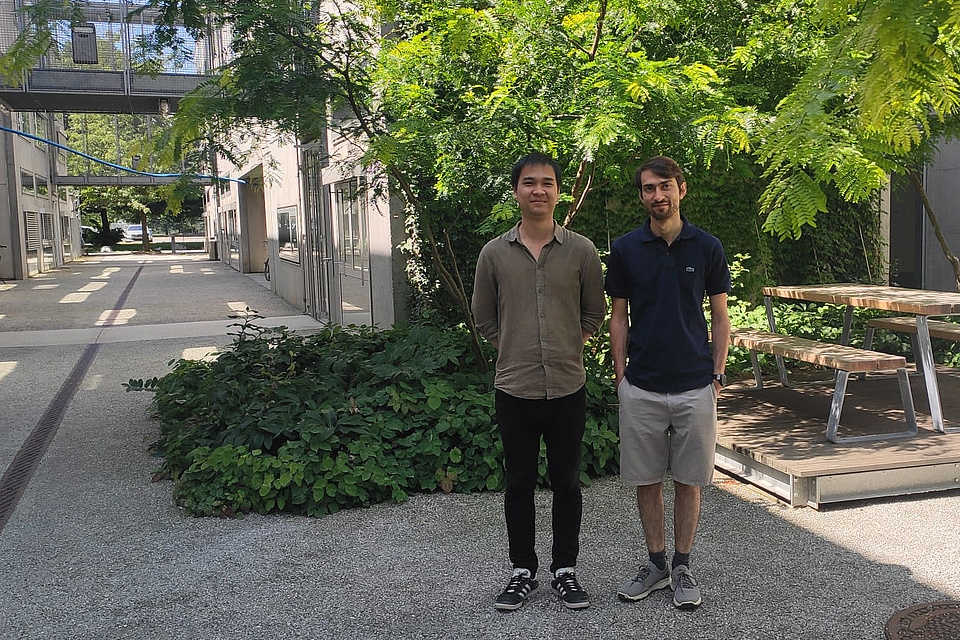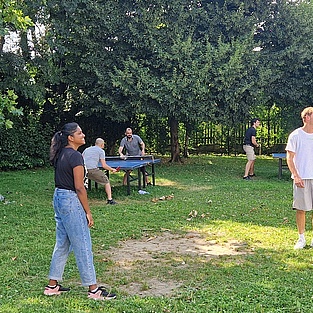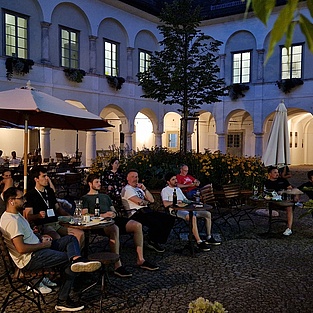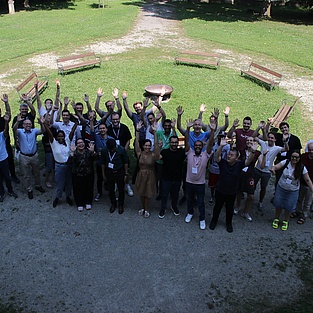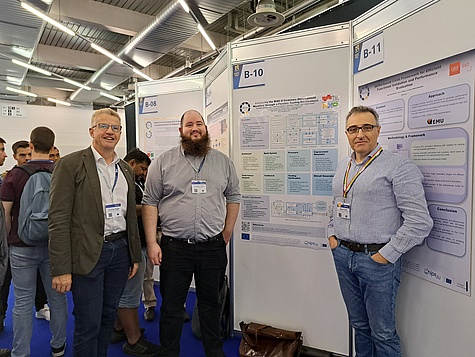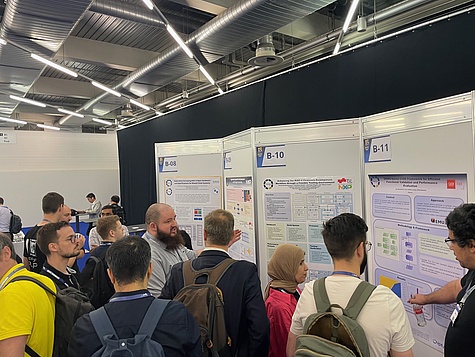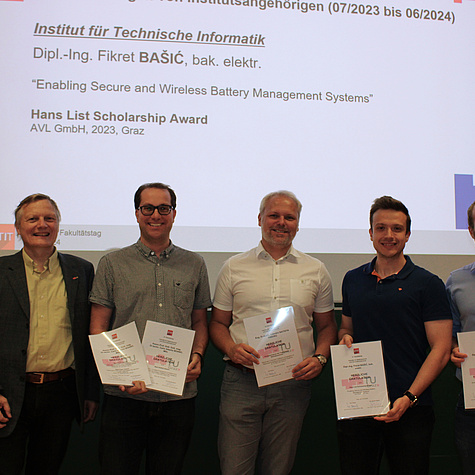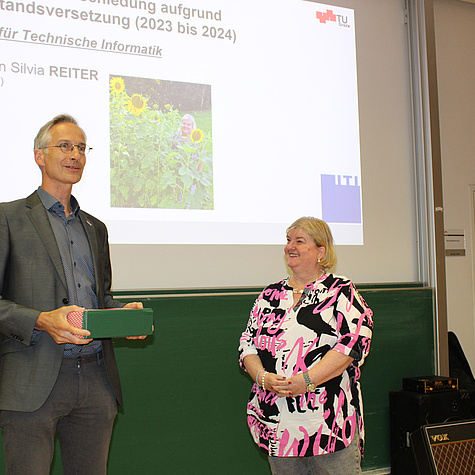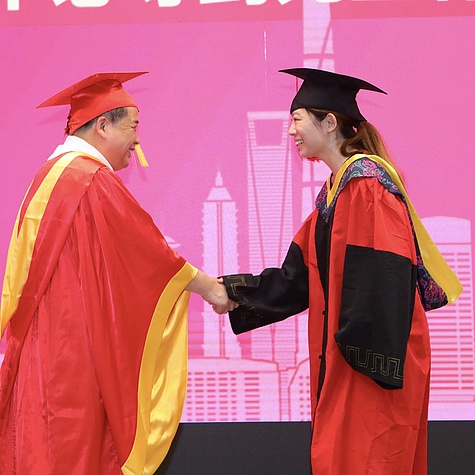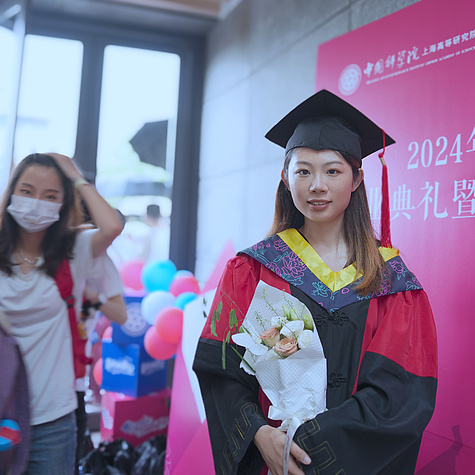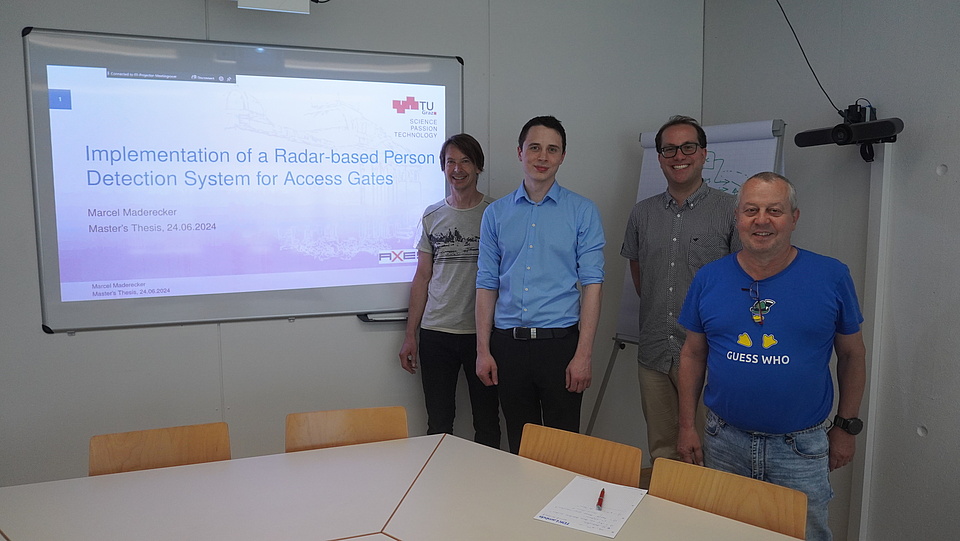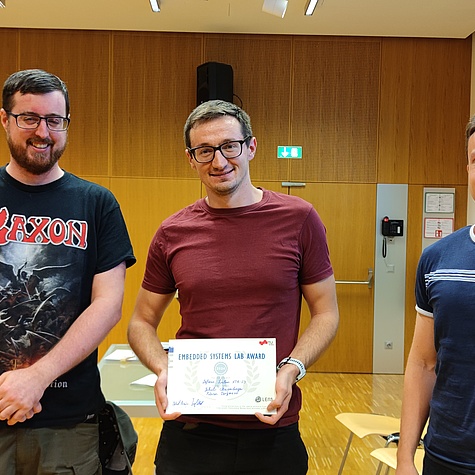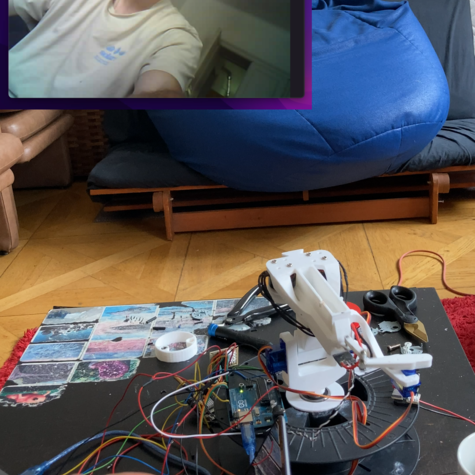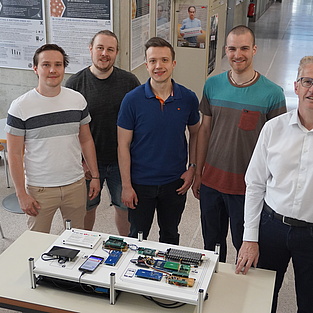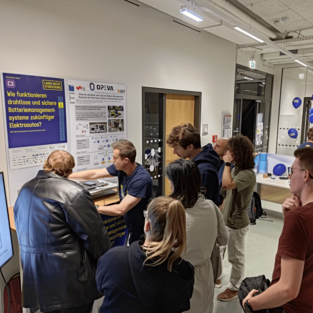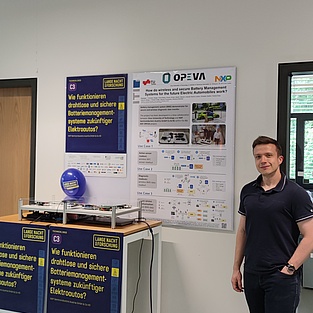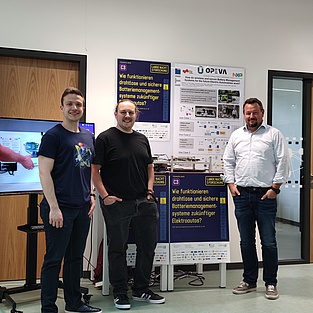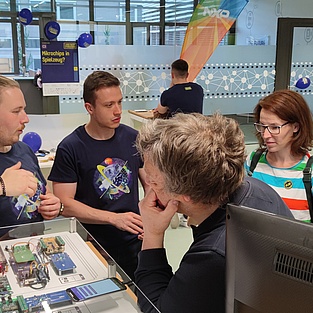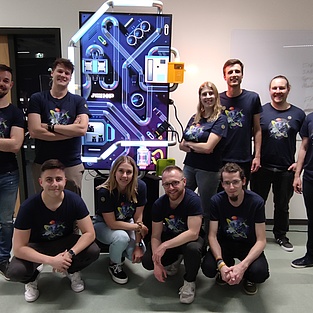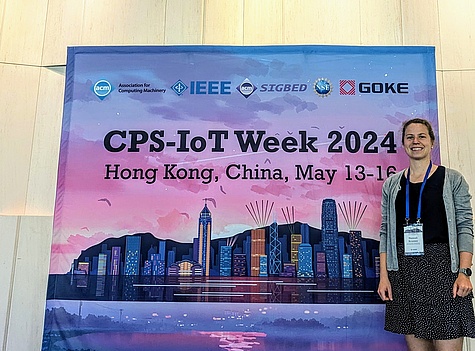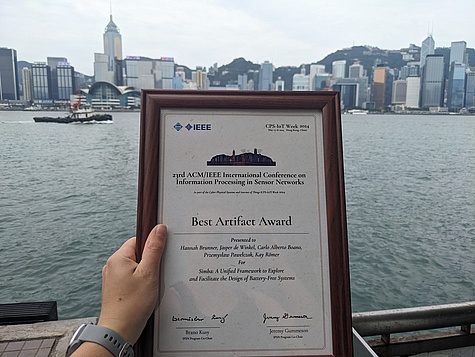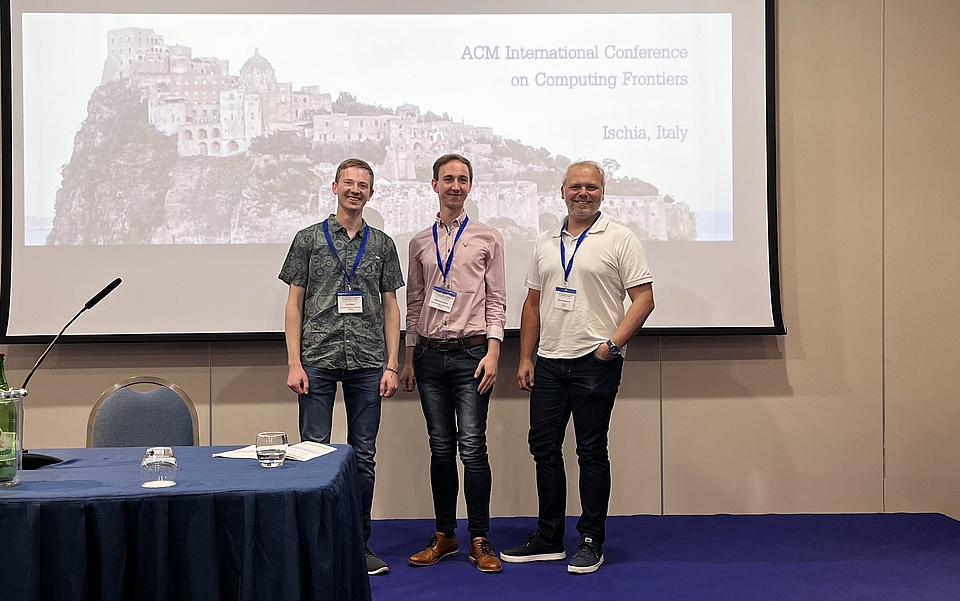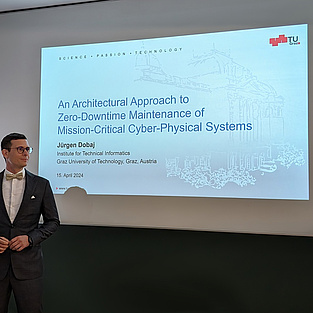Dr. Fikret Bašić Honored with Promotio Sub Auspiciis Praesidentis rei Publicae
We are thrilled to extend our heartfelt congratulations to Dr. Fikret Bašić on receiving the Promotio sub auspiciis Praesidentis rei publicae — a distinguished honor awarded for his exceptional academic accomplishments throughout school, university studies, and PhD.
The award ceremony was conducted in two formal stages. The initial ceremony took place in Graz, celebrating the accomplishments of six outstanding students. The second event was held at the Hofburg Palace in Vienna, where the President of Austria personally presented a symbolic ring to each recipient, symbolizing this lifelong achievement.
Dr. Bašić's journey with our institute began in 2017 during his master's studies when he joined as a student project assistant. In 2020, he commenced his Ph.D. in the HW/SW Co-Design group under the guidance of Ass.-Prof. Christian Steger. Following the successful completion of his doctoral degree in September 2023, Dr. Bašić continued his research as a PostDoc in the Low-Power Embedded Networked Systems group, focusing on security in wireless and embedded networked devices.
Our institute proudly welcomes Dr. Bašić as the latest Sub Auspiciis graduate, continuing a cherished tradition upheld in recent years by Dr. Tobias Scheipel, Assoc. Prof. Carlo Alberto Boano, and Dr. Thomas Ulz.
We wish Dr. Fikret Bašić all the best and much success in his future career!
Statement from the Federal President
März 2025
Celebrating Bernhard Vacarescu's Successful Master Defense
We are happy to announce that Bernhard Vacarescu has successfully defended his Master’s Thesis!
The Thesis titled “Extending BabbleSim for Bluetooth Low Energy Channel Management Development” was carried out under the supervision of Fikret Basic and Carlo Alberto Boano.
Bernhard worked on the enhancement of the BabbleSim simulator to support the development and testing of BLE channel management algorithms. The thesis focuses on the development of a simulation system that can replay arbitrary spectral interference, alongside power measurement of the BLE channel signals, and provide accurate device-level radio usage. The accuracy of the enhanced simulator is validated through comparisons with real-world hardware tests, achieving over 98% accuracy in replicating interference effects.
We congratulate Bernhard and wish him success in his future career!
März 2025
ITI Presents Research Topics
Yesterday, we presented our open Bachelor's and Master's thesis topics as part of an institute-wide event.
During the event, we also had the pleasure of handing out this semester’s ITI Student Excellence Awards to Michael Sedlak, Daniel Söls, Michael Stangl, and Bernd Stelzl.
If you're interested in exploring innovative topics or collaborating on research projects, feel free to reach out. The topics are also listed on our website here
März 2025
Bachelor and Master Theses Topics Presentation
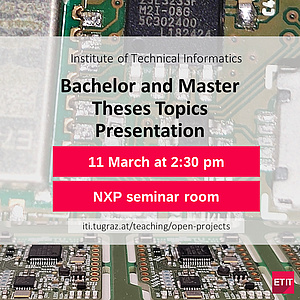
Are you searching for a thesis topic or just curious to explore your options?
Our Institute will soon present available topics for Master/Bachelor theses/projects in a dedicated in-person event, during which you will have the chance to meet our team and talk about concrete topics in a friendly atmosphere.
- Where: NXP seminar room (Inffeldgasse 16, 1st floor)
- When: Tuesday, 11.3.2025 at 14:30
More info about the institute, its working groups, and the available topics can be found at: https://www.tugraz.at/en/institutes/iti/teaching/open-projects
We look forward to seeing you there!
Our Institute at the 1st European Mobile Systems Winter School in Como
Colleagues from our institute recently participated in the 1st European Mobile Systems Winter School: “Hands-on AI and Mobile Systems: Research and Practice”, held at Villa del Grumello, Como, Italy (Feb 5-7, 2025).
Our PhD students Hassaan M. M. Hydher, Markus Gallacher, and Dženita Džafić presented their ongoing research during the dedicated poster session, contributing valuable insights to the discussion.
Additionally, as part of the teaching team, Markus Schuß delivered a lecture on "Benchmarking Low-Power Wireless Systems on Real-World Testbeds," providing participants with practical knowledge on system evaluation.
The event brought together many researchers to explore the latest advances in AI and mobile systems, with a strong emphasis on hands-on experience and collaboration.
Februar 2025
Celebrating Ahmed Ahmed's Successful Master Defense
We are happy to announce that Ahmed Ahmed has successfully defended his master’s thesis, “Enabling Dependable BLE Applications Involving Android- and iOS-Powered Smartphones.”
His thesis addresses key challenges in Bluetooth Low Energy (BLE) communication on Android- and iOS-powered smartphones. It provides valuable insights into BLE device discovery, exploring optimization techniques to enhance discovery performance in various application scenarios. Additionally, his research introduces novel approaches to overcome smartphone API limitations, enabling finer control over critical BLE parameters to improve data throughput while maintaining low latency.
This work was conducted at DEWINE Labs under the technical guidance of Michael Spörk and Rainer Hofmann and was supervised at TU Graz by Theo Gasteiger and Assoc. Prof. Carlo Alberto Boano.
We congratulate Ahmed Ahmed on this achievement and wish him great success in his future career!
January 2025
Organising and Participating at the EWSN 2024 in Abu Dhabi
A few weeks ago, we had the pleasure of participating in the International Conference on Embedded Wireless Systems and Networks (EWSN) 2024, where several of our Institute colleagues made significant contributions to the conference organization:
- Carlo Alberto Boano: A huge appreciation for being one of the general chairs of EWSN 2024 and a driving force behind the event’s organization.
- Prof. Kay Römer: Co-chaired the EWSN 2024 PhD School & Community Event and served as one of the session chairs.
- Markus Schuß: Organized and chaired the EWSN’24 Sustainability Competition, showcasing innovative approaches to sustainable technologies.
- Fikret Basic: Co-chaired and led the session for the 3rd Security and Privacy in Connected Embedded Systems (SPICES) workshop, fostering critical discussions in the security domain.
We’re also proud of the contributions made by our fellow colleagues with publications:
- Katarina Petrovic: Presented the paper “Breaking the Illusion: Real-world Challenges for Adversarial Patches in Object Detection” at the EMERGE workshop.
- Romana Blazevic: Delivered the paper “Highway Hijackers: Evaluating Patch Attack Susceptibility in Autonomous Driving Lane Detection Systems” at the SPICES workshop.
- Florian Walter Mühlbacher: Live presenting the demonstrator "Demo: A Flexible Extension Board for IoT Devices to Enable their Batteryless Operation"
- Lukas Furtner: Also presenting his demonstrator "Demo: An Affordable and Easy-to-Setup Ground Truth System to Facilitate Localization Research"
A heartfelt thank you to Michael Baddeley for the support, and the Technology Innovation Institute for sponsoring this extraordinary event and making it all possible.
We are looking forward to the next EWSN'25 conference in Leuven, Belgium!
January 2025
Christmas Dinner and Year Closing
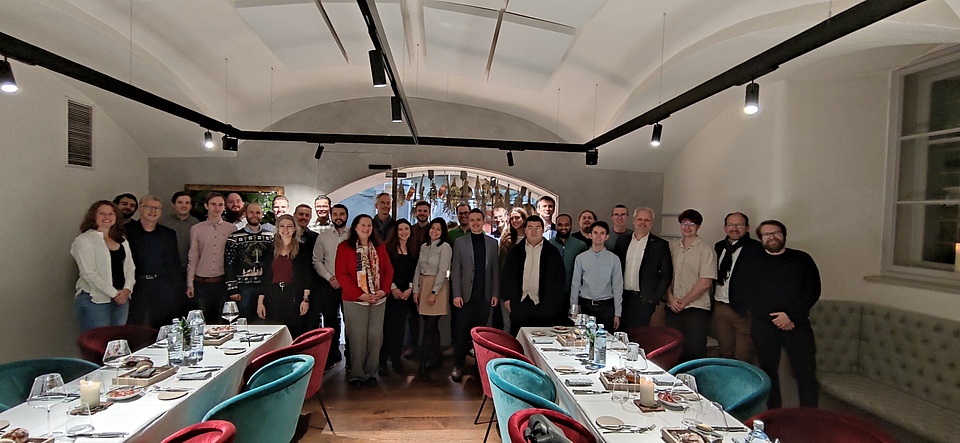
What an incredible year it has been! Wrapping up this year, a big THANK YOU to all ITI members for their strong and dedicated work in 2024. This was an especially important and busy year, but one that is now coming to a close. We had a great time celebrating all the hard work and achievements at the annual ITI Christmas party, which this year took place at Stammtisch am Paulustor.
And, with the Holidays on the horizon, even science needs to take a rest. We wish everyone Happy Holidays and here is to an even better 2025!
December 2024
An Open Educational Resource Launch: HaDes-V

We are happy to announce the latest contribution from our esteemed colleague Tobias Scheipel: HaDes-V, an Open Educational Resource (OER) tailored for RISC-V microcontroller design.
HaDes-V is a thoughtfully designed, comprehensive lab course that enables users to create hands-on, modular, and pipelined 32-bit RISC-V processors. With this OER, educators and enthusiasts alike can access both a detailed instructional guide and an open-source code template repository, sharing invaluable expertise in this field.
This resource serves as a useful starting point—whether you aim to enhance your teaching materials or delve into the intricate process of building a RISC-V processor from the ground up.
Interested in learning more? Visit: https://www.scheipel.com/news/hades-v-is-now-live/
December 2024
Celebrating Hannah Brunner's Successful PhD Defense
Congratulations to Hannah Brunner for successfully defending her PhD Thesis!
We are happy to celebrate Hannah Brunner's successful PhD defense with distinction at our institute! Her thesis, "Towards a Scalable and Sustainable Internet of Things," tackles key challenges in the Internet of Things (IoT) landscape, focusing on scalability, sustainability, and the coexistence of wireless technologies.
Key Highlights of Her Work:
- Developed innovative solutions for cross-technology communication in the 2.4 GHz band, enabling commercial Wi-Fi, ZigBee, and BLE devices to communicate directly, reducing dependency on multi-radio gateways.
- Addresses the interference issues in the shared frequency bands and presents the first experimental study on the impact of Wi-Fi 6E on UWB systems, proposing several countermeasures to mitigate these effects.
- Advanced battery-free IoT systems with an open-source simulation framework that allows exploration of design trade-offs of battery-free devices, promoting sustainable and scalable IoT deployments.
Over the years, Hannah has been an invaluable member of our institute and the LENS research group, contributing as a university assistant and teacher in courses such as Context-Aware Computing and Architecture of Distributed Systems.
We’re excited to see her future contributions and wish her continued success in her career.
Congratulations Hannah
December 2024
Participating at the SSRC Summit and GENZERO Workshop in Abu Dhabi
Recently, our research group had the privilege of attending this year's SSRC Summit and the GENZERO workshop, hosted by the Technology Innovation Institute in the vibrant city of Abu Dhabi.
At the summit, we had the pleasure of showcasing our achievements through live technical demonstrations, which highlighted our latest advancements and research outcomes.
The event provided a unique platform for exchanging ideas. We engaged in stimulating discussions, learned from the diverse expertise of other participants, and gained many valuable insights.
Looking ahead, we are excited about further cooperation and research endeavors.
October 2024
Best paper award at the WiMob'24 conference
We are proud to announce that Carlo Alberto Boano recently presented the paper "Adaptive Transmission Power Control in BLE: Unveiling and Overcoming the Limits of Current Solutions" at the 20th International Conference on Wireless and Mobile Computing, Networking and Communications (WiMob) in Paris, France, on October 22.
This research, recognized with the Best Paper Award, is a significant achievement of our team. Conducted within the LENS group as part of the TRANSACT project, it explores innovative approaches to adaptive transmission power control in Bluetooth Low Energy (BLE) while addressing critical limitations in existing solutions. A special acknowledgment goes to Elisabeth Salomon, who has been the main driving force in steering this research project to success.
We congratulate Elisabeth and Carlo on this well-deserved recognition!
November 2024
Best paper award at the WMNC'24 conference
Another great piece of news: our team is celebrating yet another best paper award!
Elisei Ember has recently presented the paper "Improving the Correction of NLoS-Induced Ranging Errors in UWB Systems through Enhanced Labeling" at the 15th IFIP Wireless and Mobile Networking Conference (WMNC) in Venice, Italy, on November 12.
This award-winning research tackles the challenge of reducing Non-Line-of-Sight (NLoS) ranging errors in Ultra-Wideband (UWB) systems. The work was carried out as part of the ENHANCE-UWB project, a collaborative initiative involving the LENS group, Pro2Future GmbH, and NXP Semiconductors.
Congratulations to Elisei and the entire team for this outstanding achievement!
November 2024
Increasing the scalability of UWB systems
We are happy to share that our colleague Maximilian Schuh recently attended the prestigious ACM SenSys 2024 conference, a flagship event in the field of networked sensing systems, where he had the honor to present our paper entitled "Understanding Concurrent Transmissions over Ultra-Wideband Complex Channels".
The research presented in this paper, conducted in cooperation with the Technology Innovation Institute, focuses on characterizing and improving the performance of concurrent transmissions over ultra-wideband (UWB) complex channels, which were previously known to be unreliable. The paper's results unlock solutions to the growing scarcity of available UWB channels and pave the way for highly-scalable UWB systems.
Max and his colleagues have conducted a large-scale experimental campaign to explore the root causes of packet loss during concurrent transmissions across different complex channels. Their findings highlight methods to significantly improve reliability (i.e., sustaining more than eight concurrent UWB transmissions on the same frequencies with a packet reception rate above 99%) while preserving the excellent ranging capabilities that make UWB technology so promising.
Congratulations to Max and his colleagues for this remarkable contribution to advancing UWB technology and for representing our institute on such an important global stage!
November 2024
Advancing Security in Bluetooth’s Audio Systems
Our colleague Theo Gasteiger recently traveled to Washington, D.C., to represent our research group at the prestigious IEEE MILCOM 2024 conference. Theo presented our team’s latest research paper, titled “BACON: Improving Broadcast Audio Authentication”. The work described in this paper was conducted in cooperation with the University of Pisa, and focuses on advancing the security of Bluetooth LE Audio.
This innovative work introduces a lightweight security mechanism for Bluetooth LE Audio systems by adapting the TESLA protocol to Broadcast Isochronous Streams (BIS). It effectively addresses critical vulnerabilities, such as the BISON attack, which our research team previously uncovered and demonstrated.
We are excited to see further research developments in shaping the future of Bluetooth security, particularly in the realm of LE Audio.
November 2024
Hannah and Sebastian Present a new Research in Battery-Free Systems at IEEE MASS 2024

A few weeks ago, Hannah Brunner and Sebastian Scholl traveled to Seoul, South Korea, to attend the IEEE International Conference on Mobile Ad-hoc and Smart Systems (MASS 2024) and presented their paper "Modelling and Comparing Converter Architectures and Energy Harvesting ICs for Battery-Free Systems."
Their work extends the open-source Simba simulator with models of five off-the-shelf energy harvesting ICs, enabling practitioners and researchers to explore design trade-offs and optimize performance in battery-free energy harvesting systems.
We look forward to the future research insights inspired by their work and see where further advances in the modeling and optimization of battery-free systems will lead.
October 2024
Thomas Faschang Presents Latest Research on Automotive Cybersecurity at ScapyCon 2024
We are happy to announce that Thomas Faschang, a PhD student of the Industrial Informatics Team at the Institute of Technical Informatics at TU Graz, recently delivered an insightful talk at the first ScapyCon automotive conference in Regensburg on September 18th, 2024. The conference conference was organized by dissecto and CYEQT, one of the leading companies for innovation in the field of automotive cybersecurity testing.
Thomas, who specializes in automotive cybersecurity, shared his expertise on the topic “Using Scapy for Cybersecurity Verification in ISO/SAE 21434”. Part of his research at the ITI is focused on developing comprehensive testing and training solutions for automotive cybersecurity.
For his work, Thomas delved into the complexities of adhering to UNECE Regulation 155 and the ISO/SAE 21434 standard as well as the new Cyber Resilience Act, which are essential for automotive OEMs and Tier 1 suppliers and contributed to advancements in the field of automotive cybersecurity.
October 2024
Bachelor and Master Theses Topics Presentation

Are you searching for a thesis topic or just curious to explore your options?
Our Institute will soon present available topics for Master/Bachelor theses/projects in a dedicated in-person event, during which you will have the chance to meet our team and talk about concrete topics in a friendly atmosphere.
- Where: NXP seminar room (Inffeldgasse 16, 1st floor)
- When: Tuesday, 08.10.2024 at 14:30
More info about the institute, its working groups, and the available topics can be found at: https://www.tugraz.at/en/institutes/iti/teaching/open-projects
We look forward to seeing you there!
ITI joins GEED 2024!
Our Institute of Technical Informatics had the pleasure to participate at this year’s “Graz Electrical Engineering Days” (GEED)! It is an insightful experience where graduation classes from many different high schools get a glimpse into the teaching and research activities at the Faculty of Electrical Engineering and Information Technology.
Over the course of two days, we were able to showcase our cutting-edge research, offering students a hands-on look into the wonders of the embedded world.
The students had the opportunity to explore and interact with several exciting experiments, including next-generation battery management systems, real-time image generator, UWB localization technology, and RC car control.
We are excited to have shared our research with such talented students and look forward to welcoming many of them to our university in the coming years!
September 2024
Successful Conclusion of the TRISTAN Conference on RISC-V
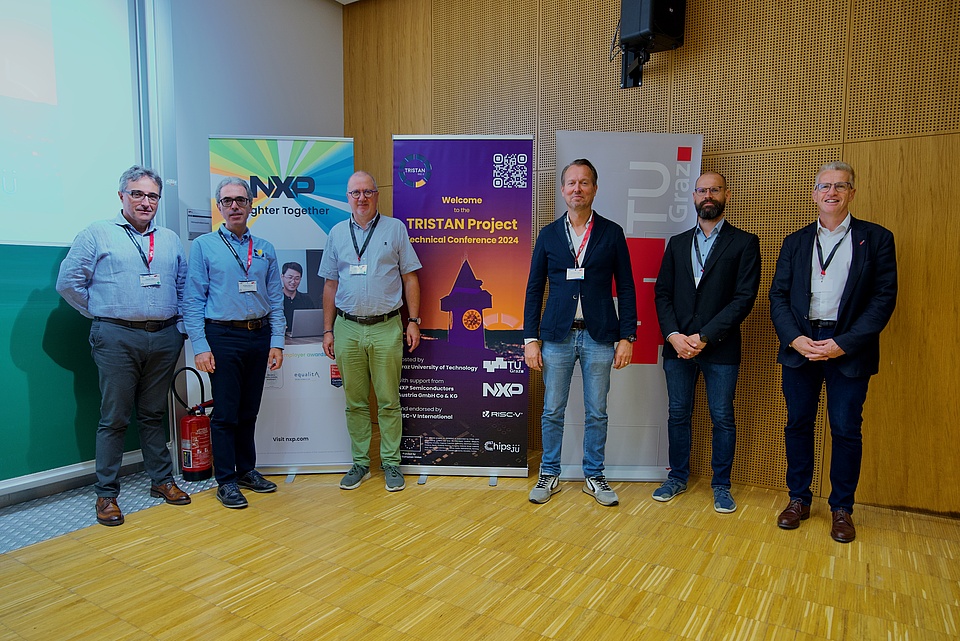
We are excited to announce the successful conclusion of the TRISTAN public conference, hosted at our campus at Graz University of Technology!
The event was organized by our Institute of Technical Informatics, in collaboration with NXP Semiconductors Austria GmbH, as part of an ongoing EU project partnership focused on cutting-edge advancements in RISC-V technology.
The event was a fantastic opportunity for RISC-V experts to connect with students and future talents. With 120 participants on-site, including 35+ registered students, it fostered invaluable networking and knowledge sharing.
Expert speakers from leading industry players like NXP, Infineon, BOSCH, Thales, and Siemens and also top academic institutions such as Graz University of Technology, TU Wien, TU Darmstadt, ETH Zürich, University of Bologna and Tampere University presented their RISC-V related research and development activities.
This was the first RISC-V conference of this scale in Austria, and we hope this initiative will inspire more investments and attention toward RISC-V and open-source technologies, helping to build a better tomorrow.
We would like to thank all of our speakers, sponsors, and organizers from the institute who have made this event possible!
Video starten
September 2024
Markus Schuß presents E-Cube
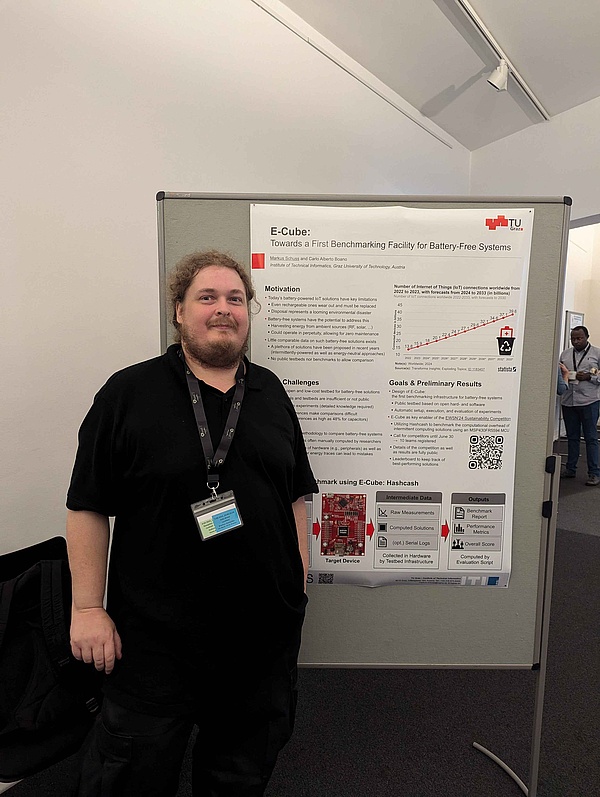
We are pleased to announce that Markus Schuß, a senior scientist from our research team, has recently presented his latest research on "E-Cube: Towards a First Benchmarking Facility for Battery-Free Systems", at this year's ACM 4th International Conference on Information Technology for Social Good (GoodIT) in Bremen, Germany!
In a world where the environmental impact of disposable IoT batteries poses a significant challenge, E-Cube offers a pioneering solution allowing to benchmark battery-free IoT systems powered by ambient energy and to quantitatively compare their performance. This allows to shed light on the performance and limitations of state-of-the-art solutions, thus pushing the boundaries of sustainable IoT technologies.
E-Cube is currently used to run the EWSN 2024 Sustainability Competition , the first event evaluating the performance of existing intermittently-powered sensing systems under the same settings.
We are excited to see the next developments of E-Cube, and what cutting-edge solutions it will inspire!
September 2024
Visiting student from France
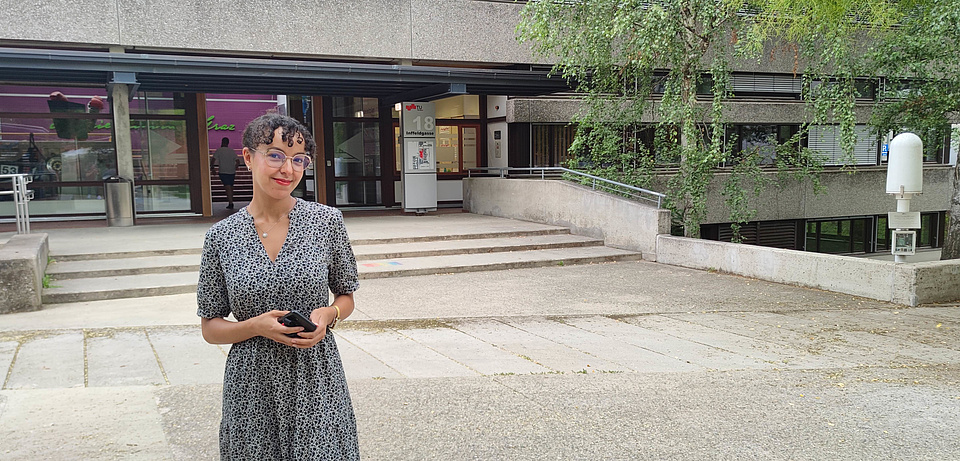
Among many visits to our team this summer, we also had a great pleasure to welcome Rachida, a talented student from École Normale Supérieure Paris-Saclay University in France.
Rachida joined the LENS group for a four-month research internship, where she focused on advancing machine learning techniques to overcome non-line-of-sight challenges in ultra-wideband localization. During the last four months, we engaged in various research activities, sharing many valuable experiences together.
We wish Rachida all the best in her future studies and hope to see her again someday!
August 2024
Invitation for the participation at the RISC-V-based Technical Conference
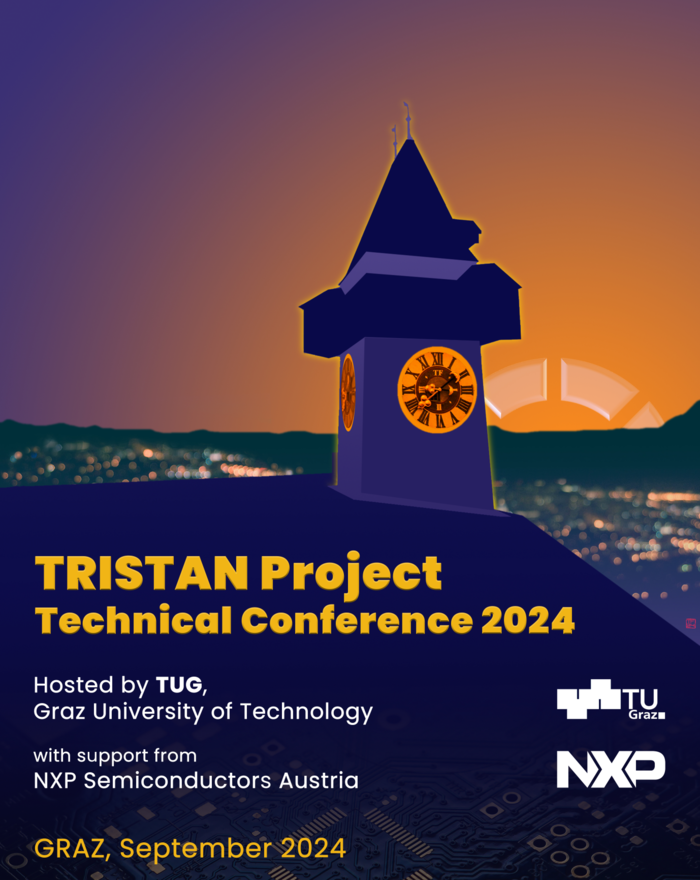
Join us for an exciting RISC-V-based Technical Conference on September 11th focused on the cutting-edge advancements in RISC-V technology! This event is a unique opportunity for researchers, students, and industry professionals to dive deep into the latest trends, innovations, and applications of the open-standard RISC-V architecture. Expect insightful talks and discussions from leading experts in both academia and industry.
We especially look forward to student insights and participation, as their fresh perspectives are crucial to driving innovation. Network with peers, share ideas, and explore collaborative opportunities in this rapidly evolving field.
The event is hosted at Graz University of Technology in cooperation with NXP Semiconductors Austria.
For more information and registration click here.
Don’t miss out on this chance to be at the forefront of RISC-V research and innovation!
August 2024
Visiting PhD students from the University of Trento
This summer, our institute is pleased to host two PhD students, Vu Anh Minh Le and Enrico Soprana, from Prof. Gian Pietro Picco's group at the University of Trento. Vu and Enrico visited the LENS group in July/August 2024 to strengthen our collaboration on ultra-wideband (UWB) research. Together with our LENS researchers, they are working to enhance UWB system performance in challenging environments.
August 2024
Summer School on Machine Learning and Optimization for Dependable Systems
Institute of Technical Informatics and FH Joanneum jointly organized a Summer School at Retzhof Castle in July 2024 in the framework of the joint doctoral program DENISE: Dependable Electronic-Based Systems. More than 30 international participants attended lectures and tutorials by experts from the US, Switzerland, Germany, Italy, and Austria. The focus of the summer school was on machine learning and optimization techniques to support dependable networked embedded systems. The participants enjoyed also the opportunity to network and socialize in the beautiful environment of Retzhof Castle.
Juli 2024
Participating at the RISC-V Summit Europe
The HW/SW Codesign Group had the pleasure of participating in the “RISC-V Summit Europe” this year with a poster presentation. The RISC-V Summit is a conference that explores new commercial applications and research results, highlighting the crucial role of strong industrial and academic communities in Europe's RISC-V success.
The team from our Institute presented its ongoing research in the field of software-defined radios (SDR) in the context of near-field communication (NFC) by Christian Sommerauer and Christian Seifert, titled: "Enhancing the RISC-V Firmware Development Workflow through a Flexible Tooling Environment". This research is a joint effort under the EU Chips JU TRISTAN project, conducted in collaboration between the Graz University of Technology and NXP Semiconductors Austria GmbH Co & KG, under the guidance of Christian Steger (TUG) and Tiberio Fanti (NXP-AT).
The presentation sparked many inspiring discussions and insightful conversations, paving the way for potential future collaborations.
Juli 2024
ITI takes part at the Faculty Day
In June, our Institute had the pleasure of participating in the “8th Faculty Day of Electrical Engineering and Information Technology.” Among the many highlights, including keynotes, games, and celebrations, we were honored to receive five special recognitions for our dedicated work over the past academic year.
Pictured from left to right, "Best Artifact Award" - Hannah Brunner, Prof. Carlo Alberto Boano, and Prof. Kay Römer for IPSN'24 publication in cooperation with TU Delft, "Best Paper Award" - Prof. Carlo Alberto Boano for DCOSS-IoT'23 and EWSN'23 publications in cooperation with Toshiba Bristol, "PhD Award from the Expert's Group on Operating Systems from GI e.V." - Leandro Batista Ribeiro for his exceptional dissertation with supervisor Prof. Marcel Baunach, "AVL Hans List Scholarship Award" - Fikret Bašić for his innovative PhD thesis, "Promotion Sub Auspiciis Praesidentis Rei Publicae" - Tobias Scheipel for the most honored and prestigious promotion.
During the event, a heartfelt recognition was also bestowed upon our cherished secretary, Silvia Reiter, who, after 36.5 years of dedicated service to our Institute, has entered a well-deserved retirement.
Thank you all for your commitment, and here's to the coming academic year and the new achievements it will bring!
Juli 2024
Mobile Computing Lab Showcases Innovative Student Projects

Prof. Olga Saukh’s Mobile Computing Lab at ITI is a prime example of a course where students can truly unleash their creativity. In this class, students embark on their own programming projects, gaining foundational knowledge essential for crafting innovative smartphone applications. Students have the opportunity to delve into various techniques, ranging from signal processing from leveraging sensors to data collection and machine learning analysis.
This year’s highlights include Dong Wang's "Master Wang Game" for activity-based gaming, Stefan Moser and Bernhard Vergeiner's "MTG Card Scanner" for Magic: The Gathering, Filippo Orru's "TopOut App" for automated bouldering video recording, and Nikolaus Ostovary's "Citizen Weather Forecast" for real-time weather predictions. These projects demonstrate the cutting-edge integration of mobile technology and machine learning. You can find videos and demos about these and many more interesting projects from the course here.
Juli 2024
Celebrating Pei Tian's PhD Promotion
Congratulations to Dr. Pei Tian for successfully defending her PhD thesis.
Dr. Tian has been an invaluable member of the LENS research group, contributing as a visiting researcher from October 2021 to October 2023. She worked on groundbreaking research concerning performance optimization with LoRa networks, publishing several joint papers with our Institute.
After years of dedication and hard work, she recently defended her PhD Thesis, titled "Research on Performance Optimization of LoRa-based Multi-hop Low Power Wide Area Networks".
We are thrilled to celebrate Dr. Tian’s achievement and wish her continued success in her career. Congratulations, Dr. Pei!
Juli 2024
Successful Master's Thesis Defense
Marcel Maderecker successfully defended his Master’s Thesis!
The Thesis "Implementation of a Radar-based Person Detection System for Access Gates" was carried out in cooperation with Axess AG, an international leading manufacturer of ticketing and access management systems.
Under the supervision of Hannah Brunner and Carlo Alberto Boano, Marcel worked on improving an important building block in one of Axess' gate solutions using the exciting Pulsed Radar technology.
We congratulate Marcel and wish him success in his future career.
Juni 2024
Celebrating Embedded Systems Lab Award Winners - Summer 2024
Congratulations to the winners of the Embedded Systems Lab Award in the summer term of 2024!
The Embedded Systems Lab Award is granted for the most innovative and creative project in the "Embedded Systems Laboratory" course. The winners are selected through a voting process during the final pitch presentations, where both students and a jury—comprising course teacher Fikret Basic and tutor Josef Kroell—cast their votes. This semester, the award goes to Jakob Oberpertinger and Fabian Burgmann for their remarkable project, where they integrated elements of face recognition technology and mechatronics into a single system. Their prize includes a certificate and a special goodie bag.
The Embedded Systems Lab is a dynamic course at ITI designed to foster a spirit of innovation and hands-on learning. This year, we witnessed an impressive array of 20 projects, ranging from RC boats to home security systems.
Congratulations to all the participants for their hard work and inspiring projects. Special kudos to our award-winning team and all the best for your future!
Juni 2024
Lange Nacht der Forschung
As part of the renowned Austria-wide event "Lange Nacht der Forschung," our Institute's team engaged with hundreds of passionate thinkers, from young enthusiasts to seasoned scientists.
Fikret Basic and his colleague Florian Scherr, alongside NXP Semiconductors Austria, presented their innovative demonstrator, exploring "How function wireless and secure Battery Management Systems of the future Electric Automobiles?"
This demonstrator is the result of years of collaboration between Christian Steger's HW/SW Codesign group and NXP Semiconductors, at present part of the ongoing EU KDT OPEVA project.
Reflecting on the event, Fikret and Florian remarked, "It was truly an unforgettable experience."
Mai 2024
Best Artifact Award at IPSN’24
Hannah Brunner visited the CPS-IoT Week in Hong Kong to present her paper "Simba: A Unified Framework to Explore and Facilitate the Design of Battery-Free Systems" at the International Conference on Information Processing in Sensor Networks (IPSN).
There, she won the Best Artifact Award for the Simba framework, which is open-source on GitHub. Congratulations Hannah!
The Simba framework helps with designing battery-free systems: these are small sensing devices that operate on harvested energy (e.g., from the sun or radio-frequency signals) and have a minimal energy budget, which makes their design rather difficult. Simba supports the designers of battery-free systems in exploring different design trade-offs in a fast and easy way based on simulation.
The work was carried out in collaboration with researchers at TU Delft, where Hannah also completed a two-week research stay in June 2023.
Mai 2024
ACM International Conference on Computing Frontiers (CF'24)
Meinhard Kissich and Leo Moser presented their latest research work at the ACM International Conference on Computing Frontiers (CF'24) in Ischia, Italy. Congratulations on the excellent presentations!
Meinhard introduced FazyRV, a scalable and minimal-area RISC-V core. The work of Meinhard and Marcel Baunach is summarized in the paper: "FazyRV: Closing the Gap between 32-Bit and Bit-Serial RISC-V Cores with a Scalable Implementation".
Leo demonstrated how FPGA stitching significantly outperforms a Sea-of-Gates approach. This work is titled "Stitching FPGA Fabrics with FABulous and OpenLane 2" and was a collaboration with Meinhard, Tobias Scheipel, and Marcel Baunach.
Mai 2024
PhD Defense – Jürgen Dobaj
Research exchange at the University of Trento
Markus Gallacher, a PhD student at our institute, recently completed a three-week ERASMUS+ staff mobility training at the Università di Trento, where he joined the Department of Information Engineering and Computer Science.
During his time there, he collaborated closely with a research group specialized in ultra-wideband (UWB), a wireless technology typically used for accurate ranging and localization applications. Their joint efforts were dedicated to enhancing UWB distance measurements, aiming to boost accuracy even in challenging environmental settings.
April 2024
ACM/SIGAPP Symposium on Applied Computing
Congratulations to Tanveer Ali-Ahmad, Drona Nagarajan, Tobias Scheipel, and Marcel Baunach on being accepted to present and publish their work at the ACM/SIGAPP Symposium on Applied Computing (SAC) 2024 in Avila, Spain. Their publications covered some crucial aspects of kernels of real-time automotive Operating Systems while keeping the strict AUTOSAR standards in mind. Both works highlight some fundamental problems prevalent in the design of RTOS kernels.
The first paper addresses the issues associated with empty activations of sequencer tasks in "Avoiding Empty Instances and Offset Drifts of Basic Sequencer Tasks in Automotive Operating System." The second work addressed a critical issue in multicore synchronization with spinlocks in "Fair and Starvation-Free Spinlock for Real-Time AUTOSAR Systems." Both works were well received, and our colleagues could gather valuable feedback for future work on designing RTOS kernels.
April 2024
FazyRV RISC-V Core is Now Open Source!

We are excited to share that FazyRV, a scalable minimal-area RISC-V core, is now open source under a permissive MIT license. The work will be presented at the Computing Frontiers 2024 conference by Meinhard Kissich and Prof. Marcel Baunach. A research paper on design insights, an in-depth evaluation, and an outlook on future work will be published soon. We invite you to explore FazyRV by checking out the GitHub repository.
April 2024
Doctorate sub auspiciis praesidentis for Dr. Tobias Scheipel
Our esteemed colleague Dr. Tobias Scheipel has been awarded with the Promotio sub auspiciis Praesidentis rei publicae, a truly special honor! He received this extremely rare promotion for his outstanding achievements at school, during his university studies, and during his PhD on “Advances in Dynamic and Reconfigurable Embedded Systems Design”. Congratulations on this remarkable success!
After his PhD, Tobias continued his research on flexible, modular and runtime reconfigurable processor architectures for embedded systems as a PostDoc at our institute. The Institute of Technical Informatics is proud to have such an excellent researcher in its ranks and wishes him all the best and continued success in his career!
Statement from the Federal President
März 2024
PhD Award from the Expert’s Group on Operating Systems

We are pleased to announce that Dr. Leandro Batista Ribeiro, who completed his PhD at our institute last year, has been granted the PhD award from the Expert's Group on Operating Systems (“Fachgruppe Betriebssysteme”) of the German Gesellschaft für Informatik (GI e.V.) for his dissertation “Advances in Dynamic Software Composition of Resource-Constrained Embedded Systems”.
The award certificate states:
“The award-winning thesis impressed the reviewers with its scope, practical relevance and technical quality. The thesis deals with concepts for partial updating and formal verification of compositional software for OS-based embedded systems. The results presented are of great importance for technology and science.”
Congratulations to Leandro for this outstanding work!
März 2024
